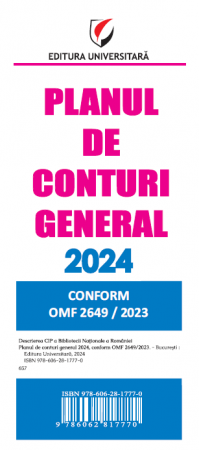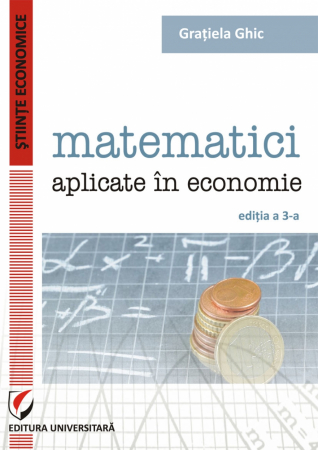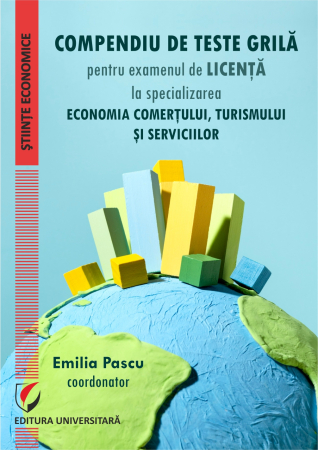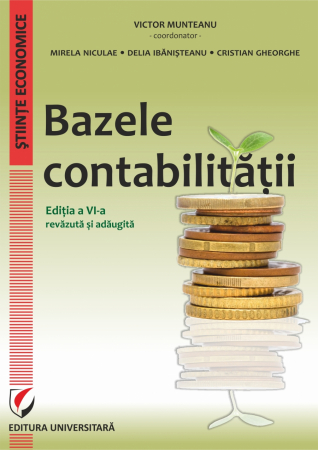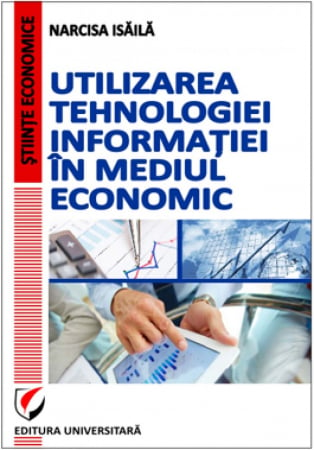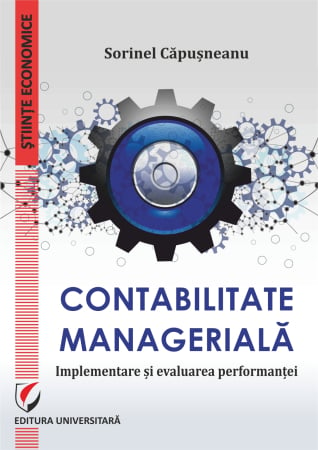6359.png) Aspects of the development of the Digital Economy in Romania. Theory, Measurement Techniques, Development Policies and Jobs
Aspects of the development of the Digital Economy in Romania. Theory, Measurement Techniques, Development Policies and Jobs
6359.png)
Publisher: Editura Universitară
Author: Catalin Ghinararu, Adriana Ana Maria Davidescu, Beatrice Chiriac, Alina Stefania Cretu
ISBN: 978-606-28-0266-0
DOI: 10.5682/9786062802660
Publisher year: 2015
Edition: I
Pages:
- Description
- Download (1)
- Authors
- Content
- More details
- Reviews (0)
The Digital Agenda for Europe is one of the seven pilot initiatives of the Europe 2020 Strategy and aims to define the key driving role that the use of information and communication technology (ICT) will have to play in achieving Europe's 2020 targets. charting a path in order to maximize the social and economic potential of ICT, especially the Internet, which is a vital support of economic and social activities, whether it is business, work, play, to communicate or to express freely. Successful implementation of this Agenda will stimulate innovation and economic growth, while improving the quality of daily life of citizens and businesses. The digital economy has three major characteristics: it is a global economy; favors intangible products: ideas, information, relationships; it is intensely interconnected. These features produce new market models of companies that are based on the electronic network.
-
Aspecte ale dezvoltarii economiei digitale in Romania.Teorie, tehnici de masurare, politici de dezvoltare si locuri de munca
Download
Dr. Ec. CATALIN GHINARARU
Ec. ALINA STEFANIA CRETU (CHENIC)
Dr. ADRIANA ANA MARIA DAVIDESCU
Researcher BEATRICE CHIRIAC
Chapter 1. National reforms for smart, sustainable and inclusive growth by 2020 / 11
1.1. Reforms and measures to improve labor market activity in the European Union in the context of the challenges of the financial crisis / 11
1.2. Digital activity in the context of the 2020/16 strategy
1.3. What is digital work? / 19
Chapter 2. Analysis of the IT industry and e-commerce in Romania / 21
2.1. The evolution of the TI&C / 21 industry
2.2. Analysis of the situation regarding the activity of Romanian companies in the conditions of building the information society in Romania / 31
2.3. Romanian e - commerce market / 36
2.4. E-commerce in the EU / 40
Chapter 3. Population access to information and information technologies / 42
3.1. Digital agenda for Romania / 42
3.2. Access and use of population computers / 43
3.3. Population access to the internet / 47
3.4. Types of connection used to access the Internet at home / 48
Chapter 4. A sociological approach regarding the dynamics of digitalization in Romania / 51
4.1. Sociological analysis regarding the dynamics of digitization in Romania / 51
4.2. Digital index of social and economic development / 75
Chapter 5. Theories and policies regarding the development of the digital economy / 82
5.1. Theoretical approaches to the digital economy / 82
5.2. Measuring the digital economy / 87
5.3. Measuring the internet economy / 89
5.4. The virtual labor market / 91
5.5. E-inclusion policies / 92
5.6. Recommendations for ensuring digital skills in Europe / 94
5.7. Competition issues in the digital economy / 95
Conclusions / 98
Bibliography / 191
Faced with an aging population and global competition, we have three options: work harder, work harder, or work smarter. We will probably have to do all three, but the third option is the only one that can guarantee a rise in the living standards of Europeans. To this end, the Digital Agenda contains proposals for action that must be taken urgently to bring Europe back on the path to smart, sustainable and inclusive growth. These proposals will form a framework for the long-term transformations produced by a society and an increasingly digitalized economy.
The Digital Agenda for Europe is one of the seven pilot initiatives of the Europe 2020 Strategy and aims to define the key driving role that the use of information and communication technology (ICT) will have to play in achieving Europe's 2020 targets. charting a path in order to maximize the social and economic potential of ICT, especially the Internet, which is a vital support of economic and social activities, whether it is business, work, play, to communicate or to express freely. Successful implementation of this Agenda will stimulate innovation and economic growth, while improving the quality of daily life of citizens and businesses. The digital economy has three major characteristics: it is a global economy; favors intangible products: ideas, information, relationships; it is intensely interconnected. These features produce new market models of companies that are based on the electronic network. The digital economy is characterized by the following characteristic features:
1. The infrastructure of the digital economy. ICT has grown rapidly recently both in the economy and in society in general. ICT support is the Internet, which is an "open gate" based on standard protocols, allowing any computer to connect using the same protocols. This allows interaction between different platforms as well as a simplified exchange of information.
2. Electronic markets. The main features of electronic markets are: new agents, new types of products and services, new business relationships, new communication and organization models. Both intangible and traditional products and services are traded on the electronic markets. Electronic commerce represents those new activities that are based on the ICT infrastructure, practically on the telecommunication networks. E-commerce is the information and products that circulate not only through the Internet but through any electronic means.
3. Products based on information and knowledge. Most existing products on the electronic markets are intangible products. They are based on information, on knowledge, they are products that do not have their physical origin. An important feature of these products is the easy way in which they can be modified and multiplied. This feature provides suppliers with the means to adapt to customer needs.
4. Agents present on the markets: consumers, businessmen, intermediaries. In the digital economy, consumers benefit from information 24 hours a day, they have access to market information regardless of distance. The difference from the traditional market also consists in the quantity and quality of information, the way of accessing, processing. The use of ICT changes the business environment: the cost of the transaction decreases, the production factors are cheaper, the labor productivity increases. In today's economy, the size of the company matters less than in the traditional economy. For buyers and sellers it is very important how they obtain the information, the speed and the cost of obtaining it. The companies had to change the way they do business, to change the structure, organization and way of thinking of the business so as to face the existing competition on the electronic markets and to adapt as well and quickly as possible to the new requirements of the consumers.
5. Macroeconomic transformations and globalization processes. From a macroeconomic point of view, the changes in the economy affect the macroeconomic variables. The Internet removes physical boundaries, favoring the evolution of the globalization process.
6. The progressive and aggressive penetration of the digital economy in the economic and social life of the modern society in the 21st century. The notion of digital economy does not imply in any case an alternative or a substitute of the classical economy. It must be treated as a branch of the modern economy with a well-defined role and purpose: optimizing and streamlining the classical economy in almost all areas by transmitting essential information in a timely manner regardless of the distance between the source and the recipient of information. Which brings besides the maximum operability and an invaluable qualitative addition to the classical economy, in the conditions of reducing the expenses afferent to the entire flow of activities necessary for the connection between the supplier and the beneficiary. The digital economy brings extra comfort and satisfaction to all participants, to all actors involved in this labor market - a fact that ultimately has the role of improving the quality of life.

![Aspects of the development of the Digital Economy in Romania. Theory, Measurement Techniques, Development Policies and Jobs [1] Aspects of the development of the Digital Economy in Romania. Theory, Measurement Techniques, Development Policies and Jobs [1]](https://gomagcdn.ro/domains/editurauniversitara.ro/files/product/large/aspecte-ale-dezvoltarii-economiei-digitale-in-romania-teorie-tehnici-de-masurare-politici-de-dezvoltare-si-locuri-de-munca-739-135626.jpg)
